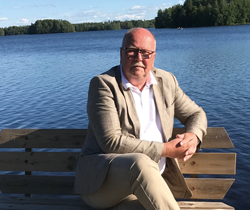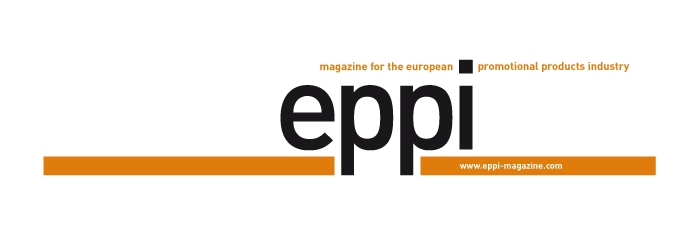SBPR (Svensk Branschförening Profil- och Reklamartiklar) is the platform and voice of the Swedish promotional products industry. Kjell Harbom, who has been the association’s CEO for ten years, on his fellow countrymen’s affinity for promotional products, the challenges of lobby work and the Swedish business mentality.
Are there any figures on the Swedish promotional products market?

Kjell Harbom
Kjell Harbom: The Swedish Institute for Advertising and Media Statistics (IRM) collects market data on the advertising industry once a year, fortunately for the past four years these have also included the expenditure on promotional products. According to which, our industry turned over 6.3 bil. Swedish Crowns last year (approx. 600 mil. Euros). As such, haptic advertising is the third largest advertising media behind online advertising and the event & sponsoring sector, which means it lies ahead of TV advertising and print. According to estimations, textiles account for up to 40% of the overall turnover of the industry. A remarkable fact: If the overall turnover of the promotional products industry is divided up between the population, the average expenditure pro capita per year would be around 630 Swedish Crowns (approx. 60 Euros), which is high in the European comparison. We obviously love product media!
What is the economic climate like on the market?
Kjell Harbom: Good at present. Since the SBPR has signed a framework agreement with DHL, I see the dispatch volume of our members every month, which I take as a barometer of the economic situation. In the first half of 2019, every month was up compared to the same month of the previous year. As in many European single markets, above all the very big and the very small companies are recording growth, whilst the medium-sized businesses are in some cases stagnating.
What else characterises the Swedish industry beyond this?
Kjell Harbom: Like many markets in Europe, the Swedish market is also strongly defragmented. On the distributor side there are predominantly many small players, many of whom work in a very oldfashioned manner. However, since many of the owners are in the meantime over 60, the market will start becoming younger and widely digitalised in the near future. The European-wide trend towards consolidation is also hitting Sweden: In the recent past, several distributors have been taken over by investment firms or retail companies – Staples purchased a key distributor in Gothenburg just recently. Everyday business life is characterised by a mentality based on reliability and serious business ethics: If us Swedes know somebody, then we trust him, a promise is a promise. Anyone, who doesn’t keep his promises, is out on the street, it is that simple.
How many companies belong to the SBPR?
Kjell Harbom: We currently have around 150 members, including distributors, suppliers and printers from Sweden as well as a number of suppliers from other European countries. As an association we offer our members a host of benefits i.e. favourably- priced framework agreements with hotels or transport and fuel companies. However, this shouldn’t be the motivation to become a member. The affairs of our industry as a whole are much more important and this should be the underlying reason.
And these are?
Kjell Harbom: Our most important task is to protect the industry against potentially damaging laws and regulations. Indeed, we have a certain influence over governmental circles. For instance, we successfully intervened when a new anti-corruption law was supposed to be introduced and we also stopped a fee being applied to USB storage media in Sweden. Furthermore, the further education of our members is a fundamental aspect. Our Education Day, which we have organised four times so far, is a big success and demonstrates the deficit of knowledge that prevails regarding themes like product safety. For example, we get our members ready for the obligatory inspections by the Swedish chemical authorities, Kemi. These issues are of course a big challenge, but at the same time this also contributes towards the professionalisation of our industry.
Which image do promotional products have in the Swedish world of marketing?
Kjell Harbom: We have been asserting ourselves for years striving for our products to be considered as advertising media, which we underline among others by using the term we created, “product media“, which has in the meantime also been adopted by several European industry associations. I recently received a letter from the Swedish Ministry of Finance. They had also heard this term and now they are discussing whether the advertising tax imposed upon certain advertising media in Sweden, shouldn’t also apply to our products – this shows how significant our lobby work is. Our industry is still coming under criticism regarding the issue sustainability – one only has to think about the plastic debate. We have to constantly work at our image and carry out explanatory work. I am a member of an international committee, which is developing the new ISO standard 22095 for traceability within the supply chains (Chain of Custody). Here, I repeatedly meet up with the representatives of big multinational groups, who have problems with the non-transparency of our industry and prefer to import promotional products themselves instead. This is very dangerous and there is plenty of work still to be done.
Which advice can you give to international promotional products companies who want to enter the Swedish market?
Kjell Harbom: The most important step is to take part at trade fairs and not just once. It puts a lot of companies off if they don’t receive the good response they are accustomed to from other regions of Europe, after their first participation at a show. But in Sweden you need to have a little more patience. You’re acknowledged in the first year, it is registered in the second year that you’re still there and the third time round you come into dialogue. Trade shows are however just the starting point, afterwards you have to hire sales representatives, who visit the customers on-site, maintain contacts and who are where possible native speakers, because many Swedes prefer to do business with fellow countrymen. Companies that want to take things slowly and only employ one person, should concentrate on the region around Stockholm, because this is where over 60% of the promotional products companies are located.
// Till Barth spoke with Kjell Harbom.



